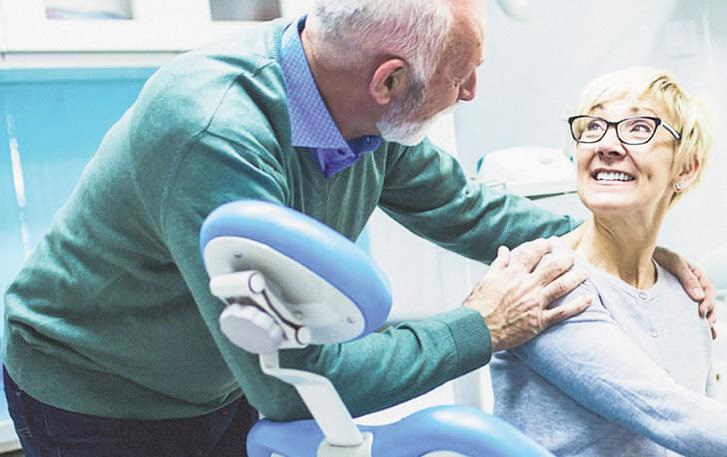ANNUAL HEALTH CARE ISSUE

DENTISTRY AND THE ELDERLY
BY SCOTT RUVO, DDS
The Baby Boomers, post-World War II Americans born between 1945 and 1964, are one of the nation's largest generations. During their lifetimes, they have benefited from vast improvements in medicine, dentistry, and public health education, and are our longest- living generation.
W hen the Baby Boomers were born, Americans could expect to live about 63 years. These days US life expectancy is about 79 years, allowing Baby Boomers well over a decade more time to enjoy family, friends, retirement and hobbies.
As people age, though, they can face more health challenges. For example, bone density and immune systems naturally weaken, which effects oral health by increasing the risk of gum disease and tooth loss. Patients can also face physical and mental disabilities due to accidents, strokes, Alzheimer's and other dementia-related diseases. Other forms of disabilities stem from neuropathy or loss of mobility due to chemotherapy and other medical treatments or severe arthritis. Whatever the root cause, patients can be left unable to properly brush their teeth for two minutes a day, twice a day, or floss. Lack of proper hygiene can lead to poor oral health, which many recent studies have linked to developing other chronic medical conditions, including diabetes and heart disease. However,
while disabilities may present challenges to maintaining one's oral and overall health, there may be simple solutions to overcome these obstacles.
One of the most common problems dentists see with elderly patients is xerostomia – or what's commonly known as dry mouth. This condition is often a side effect of medications used to treat other diseases. Patients with dry mouth don't produce enough saliva to keep their mouths wet, which can cause several problems. A moist mouth helps prevent the growth of bacteria, which can cause Halitosis or bad-smelling breath. Saliva is also essential for helping you swallow food better. Saliva has enzymes that help break down sugars and fats that help you process these foods. Lastly, saliva helps wash the teeth after eating. (Think of it like a car in a car wash.)
So, not producing enough saliva can result in plaque on the teeth after patients eat, leading to rapid, rampant tooth decay, and an increased risk of developing cavities.
The first defense against dry mouth is to drink plenty of water during and after eating. "Swish and swallow" water after eating to help get the food off your teeth and into the stomach. You don't want the plaque (food and bacteria) to sit on the teeth for too long and cause decay. When not eating, you can use sugar-free lozenges and gum to help stimulate saliva flow, helping keep the mouth moist. Artificial saliva products such as "Biotene," "Xerostom" and others can also help. Patients might also consider speaking to their physicians about changing to a different medication that doesn't cause dry mouth, or decreasing the dosage of the one they're on, to decrease the side effect of dry mouth. Oral rinses with extra fluoride also help prevent decay.